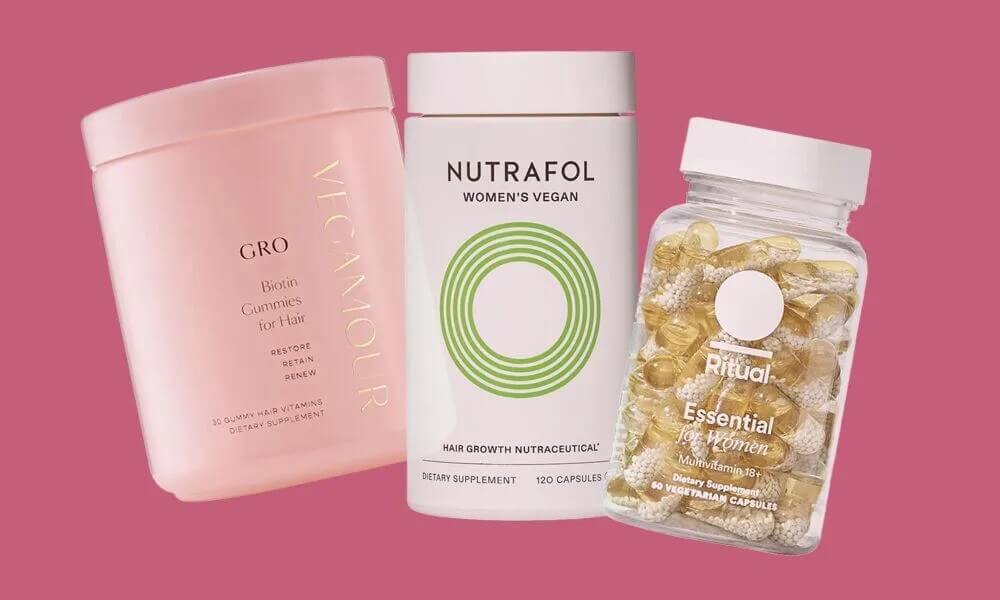Read Full Article HereHair shedding—to the tune of 50 and 100 single hairs each day—is normal. But when hair falls out, and less grows in, it can lead to hair loss, the medical term for which is “alopecia.”
If your ponytail feels smaller than usual and you’re wondering whether vitamins might help, you’re not alone. Studies show that more than 50 percent of women will experience noticeable hair loss. The most significant cause is female-pattern hair loss (FPHL), which affects about 30 million people in the United States.
Many of these women are curious about vitamins for hair growth, as well as hair-growth supplements, which usually contain a combination of vitamins, minerals and botanicals, such as palmetto or ashwagandha, says New York dermatologist Jennifer Chwalek, MD.
So we tapped derms to answer all of your questions about using vitamins for hair growth (like, do they actually work?). They’re also sharing suggestions for the best vitamins and hair growth supplements to consider adding to your cart.
Do vitamins for hair growth really work?
“The true answer is ‘maybe’ or ‘sometimes’,” says dermatologist Grapevine, TX dermatologist Daniel Walker, MD.
Hair loss is a complex medical condition with many potential root causes. “Poor nutrition, as well as other environmental and lifestyle factors such as stress, can impact gene expression and, in particular, hormone production, which can play an important role in the hair growth cycle,” says Dr. Chwalek.
More research is needed to understand whether adding vitamins or supplements into your routine works any better than getting those vitamins from your diet—or if supplementing can help hair loss from other causes besides a nutrient deficiency, such as genetic factors, Dr. Chwalek explains. The research we have is often funded by the brands themselves, making things a bit murky.
In other words, it’s a good idea to see a board-certified dermatologist for an evaluation to get an accurate diagnosis and treatment plan, as vitamins alone likely are not enough to combat hair loss, Dr. Walker says.
But that doesn’t mean vitamins for hair growth can’t be beneficial or part of your healthy-hair regimen. Hamden, CT dermatologist Mona Gohara, MD says that certain nutrients, vitamins or supplements can “strengthen the existing hair that you have or be taken in conjunction with medications and procedures that can help with hair growth.”
Dr. Walker adds that hair vitamins can be a beneficial supplement to help improve the health and integrity of the hair—think: stronger, thicker and fuller—and that overall, “they’re still worth incorporating into your daily routine.”
Which vitamin deficiencies can cause hair loss?
If you’re dealing with hair loss, your dermatologist will usually start by checking lab work for underlying deficiencies affecting your hair, Dr. Walker says. “A few of the deficiencies I look for are vitamin A, C, E, folate and zinc.”
The most common nutritional deficiency is iron, especially in women, Dr. Chwalek says, which is associated with telogen effluvium (a type of hair loss associated with increased hair shedding). There are also studies showing low vitamin D levels in people experiencing hair loss (in particular, alopecia areata, a type of hair loss that occurs when the immune system attacks the hair follicle), she says.
Along with vitamin D, the complex B vitamins are also some of the most common deficiencies, says New York dermatologist Joshua Zeichner, MD. Those with a deficiency in biotin (part of the B complex group of vitamins) commonly suffer from thinning hair, he adds.
Bottom line: “It’s really important to understand where the hair loss is coming from. That’s the first step,” Dr. Gohara says. If there is a vitamin deficiency at the root of your hair loss, a dermatologist can help you get to the bottom of it.
What nutrients make hair grow faster?
Again, it’s not clear that any specific nutrient can make hair grow faster if you aren’t deficient in it, Dr. Chwalek says.
For example, while there’s been a lot of buzz in recent years around supplements containing biotin, the dermatologists we spoke to highlighted that recent research has shown it’s unlikely to be helpful unless there’s a known deficiency—and that many foods are rich in biotin, so most people can meet their needs through their diet. (It can, however, help brittle nails, Dr. Chwalek adds.)
As Dr. Zeichner explains it, taking certain vitamins can provide hair follicles the building blocks they need to grow optimally—but they won’t change the density or activity of the follicles themselves. In other words: “You can fertilize your backyard all you like, but if there are no grass seeds, you still will have no grass.”
What are the side effects of using vitamins for hair growth?
While the jury is still out on just how effective vitamins for hair growth are, the good news is that, generally speaking, it’s rare to experience any major side effects, Dr. Chwalek says. “So long as you are healthy, with proper liver and kidney function, most of the vitamin supplements on the market that address hair thinning are safe and well tolerated,” Dr. Zeicher says.
However, it’s always a good idea to check with your physician before starting a new supplement, especially if you’re already taking any prescription medications that could interact with it, Dr. Chwalek says.
Another important reason to talk to your doctor before DIYing your vitamin regimen: Over-supplementation of certain nutrients, including selenium and vitamins A and vitamin E, can actually backfire and cause hair loss if taken in excess, Dr. Chwalek says.
How long do vitamins for hair growth take to work?
Unfortunately, hair growth is a slow process. “Hair grows about a half inch a month,” Dr. Chwalek says. That means it can take three to six months to notice improvement—or up to a year to reap the full benefit of any hair-loss treatment, Dr. Walker says.
Many of the products below require doses of multiple capsules a day, so this definitely requires commitment to the cause—but as with incorporating a new skin-care ingredient into your routine (hello, retinol), seeing noticeable benefits from vitamin supplements requires time and consistency, Dr. Zeichner adds.
Best vitamins and hair growth supplements
The derms we spoke to caution that choosing a quality vitamin or supplement can be challenging since the FDA doesn’t require manufacturers to provide proof of safety or efficacy.
A few shopping tips? “Ideally, you want to look for one that has been third-party tested to ensure its quality,” Dr. Chwalek says. “I recommend looking for clinical studies using the specific product rather than choosing a product based on an individual ingredient,” Dr. Zeichner adds.
Do Vitamins for Hair Growth Really Work?
June 7, 2024








